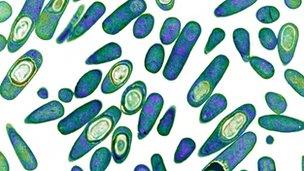Bacteria attack systems studied by Dundee University scientists
- Published

Scientists hope the research may lead to effective techniques for fighting hospital-acquired infections
Dundee University researchers are to study how certain bacteria can kill others in the hope it might help develop ways of combating hospital-acquired infections.
Scientists will look into a recently discovered "killing system" used by the bacterium Serratia marcescens.
The College of Life Sciences has been awarded a grant of £330,000 to carry out the research.
They hope to understand how the bacteria use proteins to kill rivals.
Serratia marcescens belong to a class of bacteria called "opportunistic Enterobacteria", which frequently cause antibiotic-resistant hospital-acquired infections.
Dr Sarah Coulthurst, from the College of Life Sciences at Dundee, said the bacteria themselves offer clues about how to fight them.
She said: "If we study and understand the mechanisms by which harmful bacteria survive, grow, overcome the normal defences of humans and cause disease, then we can develop new ways to combat them.
"Such new ways might be new drugs, vaccines or more efficient diagnostic tools."
She described the research as a case of "learning from the experts".
Disease target
Dr Coulthurst added: "They have excellent systems for killing off other bacteria. If we can work out how they do that then it can potentially inspire future work to develop new anti-bacterial drugs.
"We will also know more about an important class of hospital infection-causing bacteria.
"Ultimately our work may contribute towards the search for novel antibiotics and other therapeutic strategies to combat bacterial disease."
Dr Coulthurst said the bacteria was relatively easy to study in the laboratory and could be used as a model to understand how other related bacteria cause disease.
The team is keen to study a process called protein secretion, which plays a key role in the ability of several different types of pathogenic bacteria to survive and cause disease.
'Attack and destroy'
Protein secretion is a process in which bacteria move a specific set of their proteins out of the bacterial cell and into their surroundings, sometimes even injecting them directly into human cells.
These secreted proteins can then attack and destroy or hijack the cells of the infected host, causing disease.
Dr Coulthurst's research project will look at a recently discovered type of secretion system, to try to learn how bacteria can use it as a weapon to become successful pathogens.
Little is known about this new secretion system, called 'Type VI Secretion'.
Dr Coulthurst said: "It is important that we find out how this system works and what it does, since it is clear that many pathogenic bacteria use this system to help them successfully infect a host organism and cause disease.
"Our research will greatly improve our understanding of how this new secretion system is used by pathogenic bacteria to enable them to out-compete their rivals and thus prosper and cause disease in humans."
- Published24 September 2012
- Published19 September 2012
- Published7 August 2012